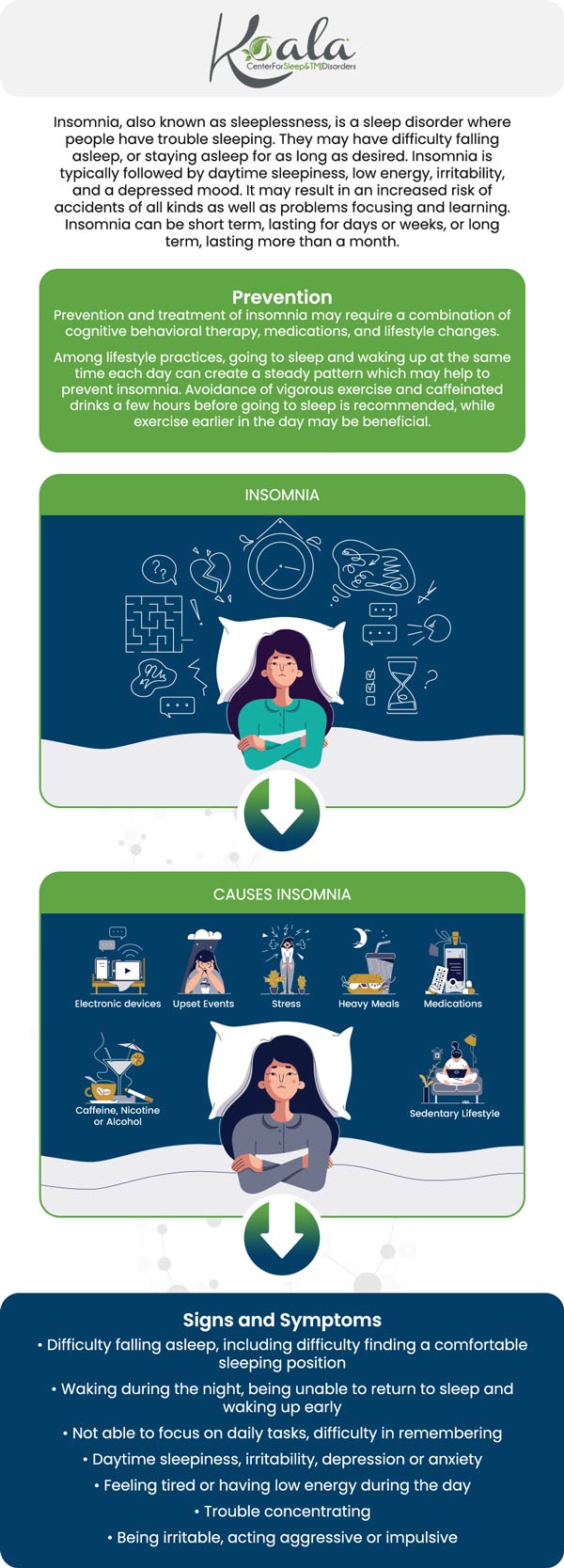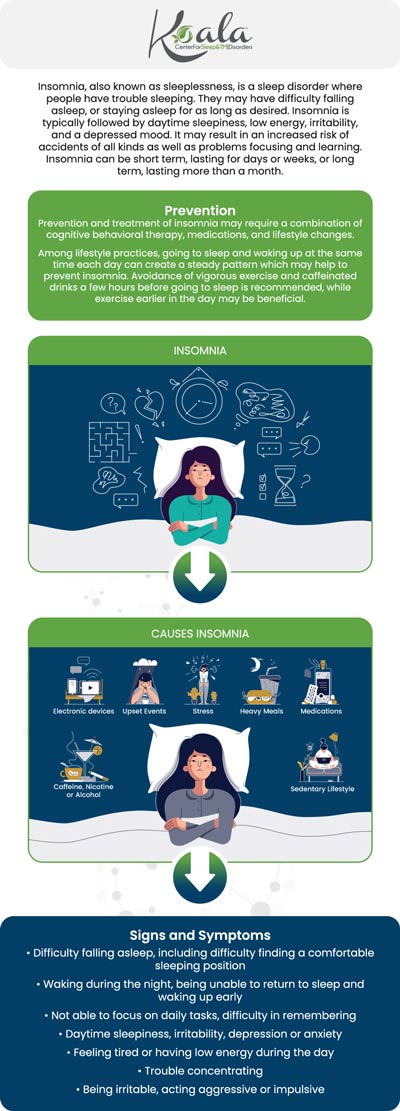Can Insomnia be Genetic?
Are you or someone you know suffering from insomnia? Visit Koala Center For Sleep & TMJ Disorders and talk to our professionals about your sleep problems and get comprehensive treatment. We accept new patients. For more information call us today or request an appointment online. We serve patients from all over the USA. Locations in Bloomington IL, Peoria/Dunlap IL, El Paso TX and Wausau WI.




Table of Contents:
Is insomnia genetic or environmental?
What gene causes insomnia?
What sleep disorders are genetic?
How is genetic insomnia treated?
Insomnia is a sleep disorder characterized by trouble falling or staying asleep, and while insomnia affects everyone differently, it often exhibits similar symptoms of restlessness, enervation, and frequent awakenings. Insomnia has a hereditary aspect, which means it often runs in families; however, insomnia can also be triggered by a variety of different factors.
Despite the prevalence of insomnia, its exact cause is often difficult to determine. There are, however, several theories about why some people are more likely to experience insomnia than others. One of the theories about why some people are more likely to experience insomnia is that insomnia may be genetic. In some cases, parents will pass down sleep problems to their children. It is also possible that insomnia might be caused by a genetic condition linked with sleep disturbances.
Including those related to sleep quality, duration, and timing, large genome-wide association studies (GWAS) have documented between 57 to 248 genetic associations with insomnia. GWAS help researchers estimate how much an individual’s genes influence a particular trait by analyzing the genetic makeup of tens of thousands of people. There are several different genes associated with quality of sleep and sleep requirements, some of these include:
– CLOCK and BMAL1, which are associated with total sleep time
– PGC-1alpha, which activates clock genes and controls the circadian rhythm
– AhR (Aryl Hydrocarbon Receptor), which suppressed Per1 production; this can disrupt CLOCK-BMAL1 activity and disturb the circadian rhythm.
– DEC2, which represses CLOCK/BMAL1 activity
– Per3, which influences whether someone will be a morning person or a night person
Scientists have focused on families and the connection with sleep disorders, even focusing on twins with similar sleep problems. It is believed that environment, physical condition, and genetics all play a part in a variety of sleep disorders, including snoring and sleep apnea. Recent research has gone as far as finding gene mutations in family members that share a particular sleep disorder.
Most causes of sleep disorders are environmental, however, several have a strong genetic link, including:
– Insomnia
– Narcolepsy
– Restless Legs Syndrome (RLS)
– Familial Advanced Sleep Phase Syndrome
– Familial short Sleep
Genetic insomnia is treated in the same way as non-genetic insomnia; lifestyle modifications are the first-line treatment for insomnia and may include:
– Create a Calming Bedtime Routine — Going to bed overstimulated or hyper-aroused can make it hard to fall asleep; it is imperative to learn how to relax before bed, so drifting off to sleep is easier. This may involve journaling, reading, meditating, drawing, or taking a warm bath.
– Transform Bedroom Environment — The right bedroom set can help instigate feelings of sleepiness and create a desire to go to sleep. The best sleep environment is calm, dark, cool, and as quiet as possible.
– Avoid Sleep-Disturbing Behaviors — Caffeine, alcohol, sugar, and tobacco all interfere with sleep quality, and if consumed in excess or too soon before bed, can contribute to sleep problems. Similarly, using electronic devices in the hours before bed can make it harder to fall asleep and cause problems in the long term; this is primarily due to the blue light from the devices which disturb the natural circadian rhythm.
– Get Exercise and Sunshine — A regular exercise routine has many positive health benefits, including quality of sleep. If the body is physically tired, it may be easier to fall asleep; the same may also be true for getting fresh air.
If insomnia is caused by an underlying health condition, the condition must be treated first in order for any insomnia treatment to be successful.
If you are experiencing the signs of a sleep disorder including insomnia, come to Koala® Center For Sleep & TMJ Disorders today. Our team can help you improve your quality of sleep, so you can return to enjoying life. Call us today to book an appointment. We have convenient locations across the U.S. in Bloomington IL, Peoria/Dunlap IL, El Paso TX and Wausau WI.

Additional Services You May Need
▸ KoalaKIDZzz®
▸ Sleep Apnea
▸ Snoring
▸ TMJ Disorder
▸ Fatigue
▸ Sleep Disorders
▸ Weight Loss
▸ CPAP Alternative
▸ Oral Appliances




